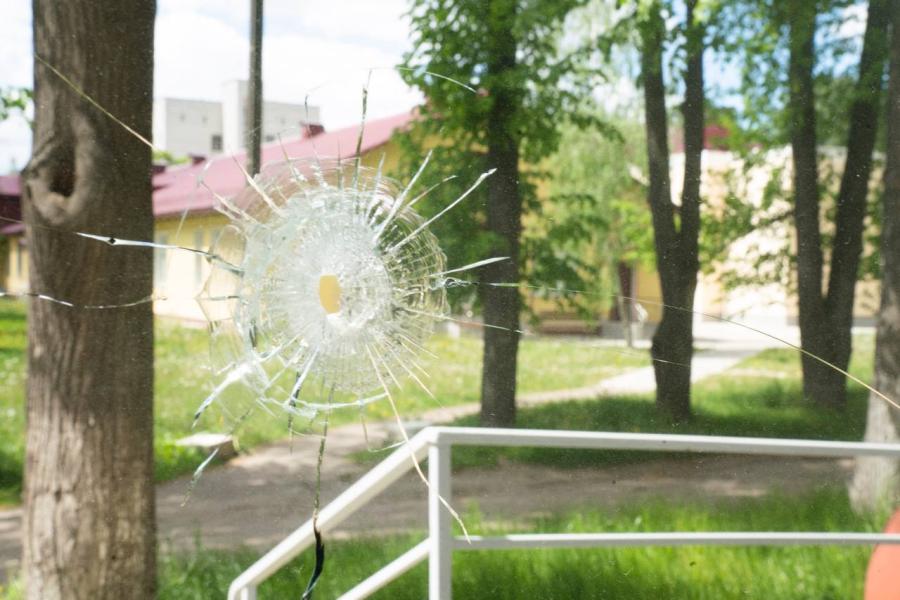WHO records 1,000th attack on health care in Ukraine over the past 15 months of full-scale war
30 May 2023
The World Health Organization (WHO) has verified the 1,000th attack on health care in Ukraine since full-scale invasion by the Russian Federation in February last year – the highest number WHO has ever recorded in any humanitarian emergency. This grim milestone yet again highlights the difficult and dangerous circumstances in which the country's health system operates, and the challenges in providing both routine and emergency healthcare services. Attacks hinder access to health care for tens of thousands of people, increasing the risks of illness and death.

The 1,004 WHO-verified attacks over the past 15 months of full-scale war have claimed at least 101 lives, including both health workers and patients, and injured many more, impacting health providers, supplies, facilities and transport, including ambulances.
WHO defines an attack on health care as “any act of verbal or physical violence, obstruction or threat of violence that interferes with the availability, access and delivery of curative and/or preventive health services during emergencies.” This can range from violence with heavy weapons to psychosocial threats and intimidation, that affect access to health care for those in need.
“These attacks threaten the safety and well-being of health workers and undermine care for people living close to conflict areas,” said Dr Jarno Habicht, WHO Representative in Ukraine. “Attacks on health care are a violation of international humanitarian law. They deprive people of the care they need and have wide-ranging, long-term consequences.”
Such an attack deprives an entire community of essential health services that are needed to save lives, leading to an increase of illness and deaths and deterioration of health systems in the longer-term. The psychological effect on patients, scared to seek health care, and health workers, unable to provide health care in safe and protected environments, is also significant and will impact the health of the population for long periods of time.
WHO continues to advocate for safe access for the delivery of health care services, free from violence, threat, or fear. This is critical to put people in need at the centre of the collective humanitarian response.
"The fact that the health system in Ukraine continues to operate amid such circumstances is a testament to the heroic dedication of healthcare workers,” continued Dr Habicht. “Despite the challenges posed first by the COVID-19 pandemic and now well over a year of war, Ukraine’s healthcare workers remain amazingly strong, brave, and patient, day after day, saving lives and providing care to those in need. We stand in solidarity with them and all those working to ensure that everyone in Ukraine has access to the healthcare they need."
WHO has been monitoring and responding to health needs in the regions most affected by fighting in the east and south of the country. According to the Health Resources and Service Delivery Availability Monitoring System (HeRAMS), health facilities in the most affected areas including Kherson, Kharkiv, Zaporizhzhia and Donetsk regions have reported facing difficulties due to a lack of security and structural damage. However, a high percentage of health facilities in these regions are functional and accessible, even though they continue to operate partially due to damage.
“Even as we continue to verify attacks on health as this relentless war grinds on, we also note that attacks on other civilian infrastructure, especially in the past six months, are indirectly impacting the capacity of the health system overall,” explained Dr Habicht. “WHO has so far reached almost nine million people with support nationwide since 24 February last year. We are stepping up efforts, along with UN and other partners, to access more areas, including regained parts of Ukraine where health needs are among the most acute.”
According to WHO data, significant challenges have been reported in providing specialized services, such as chemotherapy and mammography, due to a lack of staff and medical equipment. There are also difficulties in providing high-skilled childbirth services in some regions. Although primary healthcare remains widely available in war-affected regions, health costs have been increasing in the past half-year, with surveys conducted by WHO indicating that nearly a third of the population are finding it difficult to afford certain health services.
ENDS
NOTES TO EDITORS
- Breakdown of WHO-confirmed attacks on health in Ukraine since 24 February 2022 and up to 30 May 2023 (note that numbers add up to more than 1,004 because one attack can impact several aspects of health care):
- 896 attacks impacted health facilities;
- 273 attacks impacted supplies;
- 121 attacks impacted transport;
- 72 attacks impacted personnel;
- 27 attacks impacted patients;
- 17 attacks impacted warehouses.
- WHO uses a Surveillance System for Attacks on Health Care (SSA) to monitor and verify attacks in conflicts and humanitarian emergencies around the world. Through the SSA, WHO aims to create a comprehensive, globally inclusive, and independent monitoring mechanism. Further information available here.
- The objectives of the SSA are:
- Collect, consolidate, and openly and regularly share reliable data on attacks on health care;
- Better understand the extent and nature of the problem of attacks on health care and the consequences for health care delivery and public health;
- Produce regular reports with consolidated data and trend analysis;
- Provide the evidence base from which to implement advocacy to stop attacks on health care; and
- Identify global and context-specific trends and patterns of violence to inform and implement risk reduction and resilience measures so that health care is protected and health services are available.
- The Surveillance System for Attacks on Health Care live dashboard is available here.
For media interview requests or other queries, contact:
Tetiana Dolhova dolhovat@who.int


